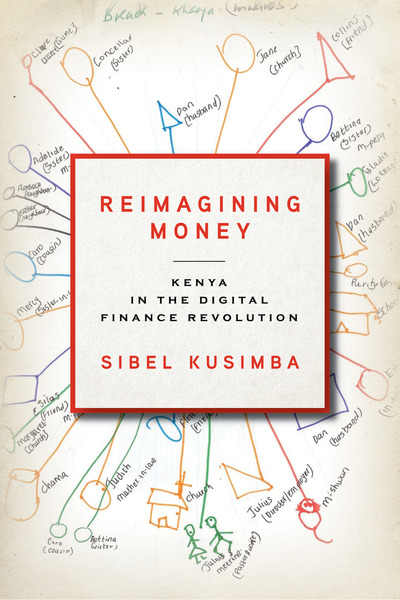
2021
240 pages.
from $28.00
Paperback now $14.00 (50% off)
Hardcover ISBN: 9781503613515
Paperback ISBN: 9781503614413
Ebook ISBN: 9781503614420
Finalist of the 2023 SEA Book Prize, sponsored by the American Anthropological Association (AAA) - Society for Economic Anthropology.
Technology is rapidly changing the way we think about money. Digital payment has been slow to take off in the United States but is displacing cash in countries as diverse as China, Kenya, and Sweden. In Reimagining Money, Sibel Kusimba describes the rise of M-Pesa, and offers a rich portrait of how this technology changes the economic and social landscape, allowing users to create webs of relationships as they exchange, pool, borrow, lend, and share digital money in user-built networks. These networks, Kusimba argues, will shape the future of financial technologies and their impact on poverty, inclusion, and empowerment. She describes how urban and transnational migrants maintain a presence in rural areas through money gifts; how families use crowdfunding software to assemble donations for emergency medical care; and how new financial groups invest in real estate and fund weddings. The author presents fascinating accounts that challenge accepted wisdom by examining the notion of money as wealth-in-people—an idea long-cultivated in sub-Saharan Africa and now brought to bear on the digital age with homegrown financial technologies such as digital money transfer, digital microloans, and crowdfunding. The book concludes by proposing a new theory of money that can be applied to designing better financial technologies in the future.
About the author
Sibel Kusimba has conducted over twenty years of ethnographic research and archaeological fieldwork in Kenya. She is Associate Professor of Anthropology at the University of South Florida and is the author of African Foragers (2003).
"Mobile money articulates Kenyans to multiple forms and forces of value in global and local economies. In this provocative, nuanced ethnography, Sibel Kusimba asks the question: can money be designed for the 'wealth-in-people' that sustains lives and livelihoods in an ever-more precarious world?"
—William Maurer, University of California, Irvine
"Kusimba provides a rich, thought-provoking narrative that vividly captures the lived experiences and contexts of the Kenyan people. Reimagining Money has huge potential in guiding studies in other fields, especially community development. This is truly a masterpiece."
—Milcah Mulu-Mutuku, Egerton University
"A remarkable, deeply researched book. Kusimba gifts readers with a vivid account of the world of money and technology, beautifully revealing how the everyday use, and sometimes non-use, of M-Pesa weaves monetary exchanges inside webs of relationships."
—Nina Bandelj, University of California, Irvine
"Reimagining Money offers a rich source of knowledge and insight on a topic that surely will gain in significance in the years ahead."
—Jürgen Schraten, Finance and Society
"The primary purpose of money, as Kusimba beautifully illustrates through her detailed ethnography, is to create 'wealth-in-people.' Money is but a means to build and accrue valuable relationships with others which enhance one's status and authority. The key 'resources' in life, the most valuable ones, are not minerals, technologies, or even profits; they are human relationships that be called upon and mobilized to facilitate a range of social projects and forms of assistance."
—Jenny Huberman, Reviews in Anthropology
"Reimagining Money: Kenya in the Digital Finance Revolution is an impressive monograph. Kusimba, who hails from the United States of America (USA), migrates between her place of employment in the USA and East Africa, where she does field research and relational work. This configuration of the work–home dynamic produced useful ethnographic encounters 'in the field' with research respondents and family alike.... As such, her relations with her Kenyan kin drew her into this revolution as participant, not mere bystander."
—Detlev Krige, Anthropology Southern Africa